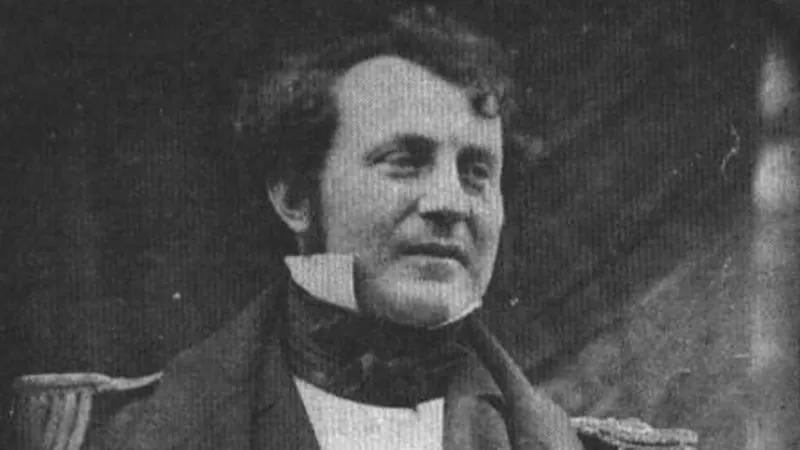
Shocking Discovery: Cannibalism Among Franklin's Crew Revealed Through DNA Analysis
2024-10-11
Author: Ken Lee
Shocking Discovery: Cannibalism Among Franklin's Crew Revealed Through DNA Analysis
In a captivating revelation from the treacherous Arctic frontier, archaeologists have confirmed that the cannibalized remains of a senior officer from Sir John Franklin’s fateful 19th-century expedition belong to none other than James Fitzjames, captain of the HMS Erebus. This harrowing discovery sheds light on the grim fate that befell Franklin's crew during their ill-fated journey through the Northwest Passage, an area notorious for its perilous conditions and treacherous ice.
The analysis, which compared DNA from Fitzjames's remains to samples from living descendants, provides a chilling look into the expedition's final days in 1848. After the initial departure in 1845, the temperature plummeted and supplies dwindled; Franklin and 23 of his men had already perished before Fitzjames and 105 others attempted a harrowing escape over land. Tragically, none survived this desperate retreat.
Archaeologist Doug Stenton, who led the research, recounted the rapid decline of conditions faced by the crew, stating, “It went horribly wrong, horribly quickly.” Stenton's team identified Fitzjames’s skeleton among 451 bones attributed to at least 13 crew members discovered in 1993 on King William Island. The latest findings, published in the Journal of Archaeological Science, not only illuminate the cultural and historical significance of Fitzjames, but they also evoke a potent personal connection as his legacy melds with the lives of modern-day descendants.
Local Inuit narratives from the 1850s suggested extreme measures taken by the crew members, including cannibalism, as they sought to survive their dire circumstances. Initially doubted, later investigations revealed cut marks on bones, confirming these grim reports from centuries past. The findings have reopened discussions about those harrowing days, painting a tragic image of desperation among men accustomed to the hierarchy and discipline of naval life.
In a striking twist, Fitzjames is now recognized as the highest-ranked officer known to have been cannibalized, illustrating the collapse of societal norms under the unbearable weight of starvation. “The fact that it was an officer who was subjected to such a fate tells us just how drastic the situation had become,” said Claire Warrior, a historian from the National Maritime Museum in London.
DNA testing played a crucial role in this identification effort. After experts collected samples from Fitzjames's remains found at Erebus Bay—about 80 kilometers south of where the crew tried to escape—they subsequently confirmed familial connections with living relatives, including Nigel Gambier, a direct descendant residing in Eastern England. Gambier expressed both gratitude and a profound sense of connection to his ancestor’s tragic story.
The fate of the HMS Erebus and her sister ship, HMS Terror, which were lost to the ice, has fascinated historians and the public alike, inspiring works of literature and television, such as the acclaimed series "The Terror." Explorations of the wreck sites—discovered in 2014 and 2016—have fueled a relentless pursuit of the truth behind Franklin's expedition.
As further DNA analysis continues, historians hope to uncover more clues about the conditions that led to such desperate choices on the icy frontier. Each bone offers whispers from a world long past, drawing us closer to understanding the humanity that endures even in the most horrifying of circumstances.
Stay tuned as this story develops, and the mysteries of Franklin’s lost expedition continue to unravel—proving that history, once buried, can still haunt the present!




 Brasil (PT)
Brasil (PT)
 Canada (EN)
Canada (EN)
 Chile (ES)
Chile (ES)
 España (ES)
España (ES)
 France (FR)
France (FR)
 Hong Kong (EN)
Hong Kong (EN)
 Italia (IT)
Italia (IT)
 日本 (JA)
日本 (JA)
 Magyarország (HU)
Magyarország (HU)
 Norge (NO)
Norge (NO)
 Polska (PL)
Polska (PL)
 Schweiz (DE)
Schweiz (DE)
 Singapore (EN)
Singapore (EN)
 Sverige (SV)
Sverige (SV)
 Suomi (FI)
Suomi (FI)
 Türkiye (TR)
Türkiye (TR)